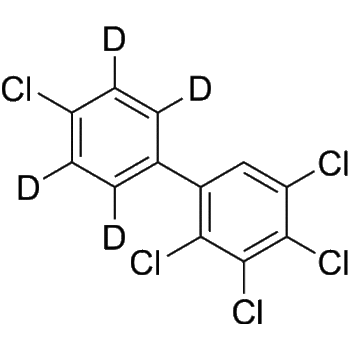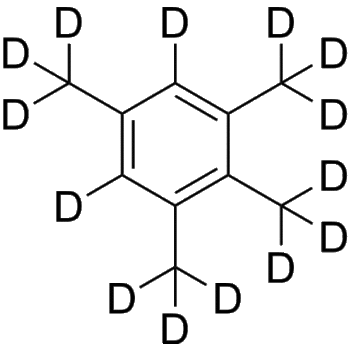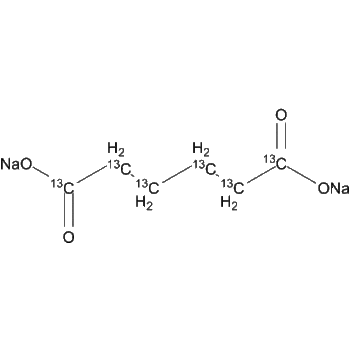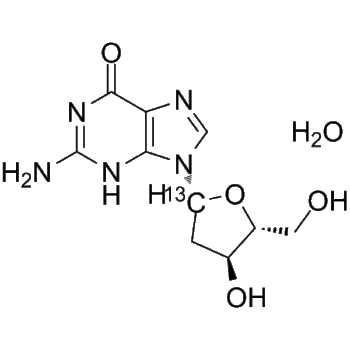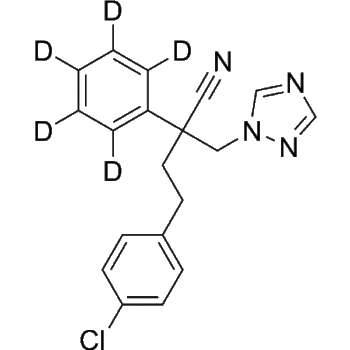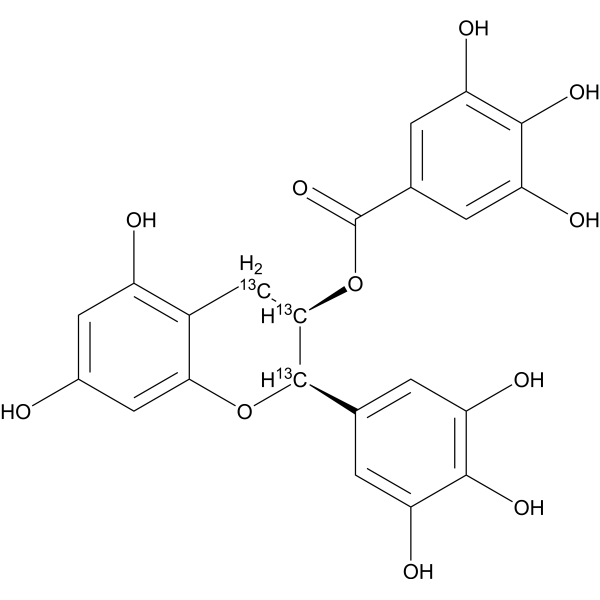
Download Files:
(+/-)-Epigallocatechin Gallate-13C3
Products Details
Product Description
– (+/-)-Epigallocatechin Gallate-13C3 is the 13C-labeled (-)-Epigallocatechin Gallate. (-)-Epigallocatechin Gallate is a tea flavonoid with potent antioxidant, antiinflammatory, and anticarcinogenic properties. (-)-Epigallocatechin Gallate is reported to inhibit EGFR signaling and thereby exert anticancer effects[1]. (-)-Epigallocatechin Gallate (EGCG) is a glutamate dehydrogenase 1/2 (GDH1/2, GLUD1/2) inhibitor. Epigallocatechin-3-gallate induces oxidative phosphorylation (OXPHOS) by activating cytochrome c oxidase.
Web ID
– HY-13653S
Shipping
– Room temperature
Molecular Formula
– C19 13C3H18O11
References
– [1]Peeters TH, et al. <i>Isocitrate dehydrogenase</i> 1-mutated cancers are sensitive to the green tea polyphenol epigallocatechin-3-gallate. Cancer Metab. 2019 May 20;7:4.|[2]Wing Pui Tsang, et al. Epigallocatechin gallate up-regulation of miR-16 and induction of apoptosis in human cancer cells. The Journal of Nutritional Biochemistry. 2010, 21(2): 140-146.|[3]De Amicis F, et al. Epigallocatechin gallate inhibits growth and Epithelial-to-Mesenchymal Transition in human thyroid carcinoma cell lines. J Cell Physiol. 2013 Apr 1.|[4]Castellano-González G, et al. Epigallocatechin-3-gallate induces oxidative phosphorylation by activating cytochrome c oxidase in human cultured neurons and astrocytes. Oncotarget. 2016 Feb 16;7(7):7426-40.|[5]Jin H, et al. Epigallocatechin gallate inhibits the proliferation of colorectal cancer cells by regulating Notch signaling. Onco Targets Ther. 2013;6:145-53.|[6]Russak EM, et al. Impact of Deuterium Substitution on the Pharmacokinetics of Pharmaceuticals. Ann Pharmacother. 2019;53(2):211-216.
Molecular Weight
– 461.35
SMILES
– O=C(O[13C@H]1[13C@@H](C2=CC(O)=C(O)C(O)=C2)OC3=CC(O)=CC(O)=C3[13CH2]1)C4=CC(O)=C(O)C(O)=C4
Clinical Information
– No Development Reported
Research Area
– Cancer
Solubility
– 10 mM in DMSO
Target
– Autophagy;Endogenous Metabolite;Ferroptosis;HIV;Mitochondrial Metabolism;Reactive Oxygen Species
Pathway
– Anti-infection;Apoptosis;Autophagy;Immunology/Inflammation;Metabolic Enzyme/Protease;NF-κB
Product type
– Isotope-Labeled Compounds
Disclaimer: All products are for Research use only unless clearly stated otherwise on the product datasheet. Datasheets provided on the website are drafts for reference purpose only and you are requested to always refer to the hard copy included in the kit for your experimentation. Agdia Products are available for delivery only in Canada.

